Graduating from post-secondary school is an exciting accomplishment, but when you come out of school with student loan debt, you have to face loan repayment.
If you receive loans from multiple sources, such as the federal and provincial governments, or private loans and lines of credit from banks, you will have several payments to keep track of. Knowing all about your student loans and who your lenders are can help you plan for repayment.
Student loan debt is your responsibility, and depending on the job market when you graduate, it might be a struggle to keep up with payments and other expenses. Consolidating your student loans, if possible, may help make your loan repayments manageable as you navigate your post-grad circumstances. However, in as much as student loans are guaranteed by the government, it is unlikely that any lending institution would choose to consolidate them with other debts.
Different Types of Student Loans in Canada
Canadian students can access student loans from the government or financial institutions:
- Federal student loans are offered through the Government of Canada, and the interest rates are set for the whole country
- Provincial or territorial loans are specific to each province and territory, with interest rates set by the provincial or territorial governments
- Private loans or lines of credit are typically obtained through banks to help fill the gaps if government loans are not enough, but these loans tend to have higher interest rates
Government student loans do not accumulate interest during your period of study, and you have a 6-month grace period after you finish school where you do not have to make payments.
Following your period of study, the National Student Loan Service Centre for your federal loan and student aid office for provincial loans will contact you with a predetermined payment schedule. In some provinces, the Government of Canada and the provincial government will integrate their loans into a single payment, but in Alberta and other provinces, they are separate payments.
Private loans and student lines of credit will begin to accumulate interest right away, and generally, you must make the interest payments while you are studying. You will not be charged the amount you borrow on your student line of credit or loans until you graduate.

How Does Student Loan Consolidation Work?
Debt consolidation merges two or more debts into a single payment. In New Brunswick, Newfoundland, Ontario, and Saskatchewan, federal and provincial loans will automatically consolidate into a single payment. In other provinces, including Alberta, you have to make individual payments for each loan.
If you have a lot of student loan debt along with consumer debt or other loans and lines of credit, you may be able to consolidate these with a debt consolidation loan. However, with today’s interest rates rising, it is unlikely there would be any savings on interest payments on the student loan portion.
Student Loan Help After Graduation
You have other options available to help ease the stress of student loan repayment.
Repayment Assistance Plan
The Government of Canada and provincial governments have the Repayment Assistance Plan (RAP) to help those struggling to pay back their loans. Whether you have a low income or a disability affecting your earnings, you can apply to have your payments reduced or eliminate payments entirely. Every RAP period is 6 months, so you need to keep reapplying if you are still eligible.
Can Debt Consolidation Help You Pay Off Student Loans?
Consolidating your government loans into a bank loan, if applicable, can have its benefits:
- Failure to repay your government loans can lead to a seizure of your tax refunds, but this is not a concern with bank loans
- You may be able to negotiate a comparable interest rate
- You may have more flexibility in your repayment schedule by extending the loan period
To qualify for a consolidation loan, you may need to have the following:
- A credit history that shows lenders you are reliable
- A stable income
- A co-signer with good credit, if you lack a credit history
Consolidating your government student loans can cause you to miss out on tax deductions on the accrued interest. However, depending on your interest rate with your student loans or any other debt you have, consolidation may be the answer to easing your debt responsibilities but if student loan interest is tax deductible this may be more beneficial.
Get Advice Managing Student Loan Debt
If your student debt is overwhelming, A.C. Waring & Associates can help you find a solution, depending on your circumstances. Be sure to contact us to learn more about your options.





